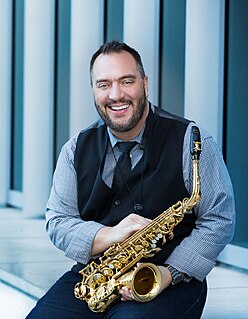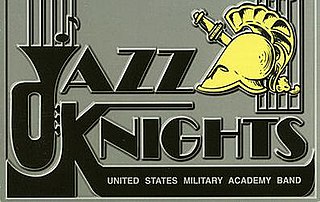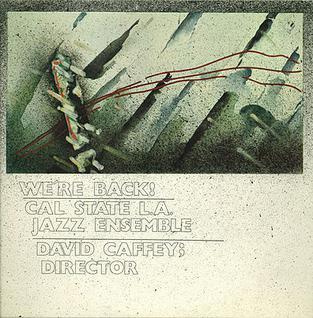Vernice "Bunky" Green is an American jazz alto saxophonist and educator.
Larry Ridley is an American jazz bassist and music educator.

Jazz at Lincoln Center is part of Lincoln Center for the Performing Arts in New York City. The organization was founded in 1987 and opened in October 2004. Wynton Marsalis is the artistic director and the leader of the Jazz at Lincoln Center Orchestra.
Conservatoires UK, also known as CUK, is a group that represents eleven British conservatoires.
Irving Herbert Pomeroy III was an American jazz trumpeter, teacher, and the founder of the MIT Festival Jazz Ensemble.
Rufus Reid is an American jazz bassist, educator, and composer.

Mathias Eick is a Norwegian jazz musician, and the brother of the jazz musicians Johannes Eick and Trude Eick. He is mainly known from his releases on the jazz label ECM Records. His main instrument is the trumpet, but he also plays upright bass, vibraphone, piano and guitar. He has performed with several well-known music groups and musicians, e.g. Jaga Jazzist, Manu Katché, and the Trondheim Jazz Orchestra together with Chick Corea and Pat Metheny. Besides this he is also known for his collaboration with Norwegian singer-songwriter Thomas Dybdahl, and recordings with the Norwegian bands Turboneger, DumDum Boys, Motorpsycho, D'Sound and Bigbang.
International Jazz Festivals Organization (IJFO) is an umbrella organization including 16 leading jazz festivals worldwide.
Peter Mampreh Dombourian, was active in musical circles in New Orleans, Louisiana, as a music educator, conductor, and musician.

Caleb Chapman is an American music educator, author, entrepreneur, producer, bandleader, and musician from Derry, New Hampshire who currently resides in Utah. A graduate of Brigham Young University, he is the founder and Chairman of Caleb Chapman's Soundhouse, a professional musician training program with locations across the U.S. and the director of Caleb Chapman's Crescent Super Band. Chapman has been recognized for his contributions to music education and has received numerous honors for his work as an educator.
Timeline of jazz education : The initial jazz education movement in North American was much an outgrowth of the music education movement that had been in full swing since the 1920s. Chuck Suber (né Charles Harry Suber; 1921–2015), former editor of Down Beat, averred that the GI Bill following World War II was a key impetus for the jazz education movement in higher education. During the WWII, the U.S. Armed Forces had been the nation's largest employer of musicians – including women musicians. After the War, many of those musicians sought to pursue music as a career, and, with assistance of the GI Bill, found colleges offering curricular jazz. Suber also pointed out that the rise of stage bands in schools was directly proportionate to the decline of big name bands.
Each style and era of jazz adopted new techniques to help educate younger musicians. Early forms of jazz education were more informal. Since the first degree program was founded in 1947, the rise of institutionalized jazz education, resulted in jazz education becoming more formalized and more structured. Formalized jazz education has brought a new wave of interest in jazz. JazzTimes.com currently lists 492 collegiate jazz programs globally. This database is exclusive to just schools that offer majors and does not include the number of schools that also offer jazz courses in their curriculum. The formalization of jazz was and still is a controversial subject. Many professional musicians believe that it has harmed the spirit of the music, while others maintain that it has been beneficial for the art form.
Morris Eugene Hall(akaM.E. "Gene" Hall; 12 June 1913 Whitewright, Texas – 4 March 1993 Denton, Texas) was an American music educator, saxophonist, and arranger, known for creating and presiding over the first academic curriculum leading to a bachelor's degree in jazz at an institution of higher learning, being at the University of North Texas College of Music in 1947.
Stephanie Nakasian is an American jazz vocalist and voice teacher.
William Franklin Lee III, aka Bill Lee was an American jazz pianist, composer, arranger, author, and music educator who was renowned for pioneering comprehensive music education, including jazz, at the collegiate level. He led the University of Miami School of Music and was Miami's third music dean from 1964 to 1982. In 1989 he retired from the university, but he continued to work in music education at other institutions. He was distinguished professor emeritus of music theory and composition and emeritus composer in residence. Lee was vice-president and provost at the University of Miami and president and executive director of IAJE.

The Oklahoma Jazz Hall of Fame, located in Tulsa, Oklahoma, is a non-profit organization that honors jazz, blues and gospel musicians in the state of Oklahoma. Housed in the former Tulsa Union Depot, which it now calls the Jazz Depot, the Hall of Fame is a music venue that hosts regular jazz performances. It is also a museum, displaying photographs, biographical information, artifacts, and memorabilia from musicians such as Chet Baker, Earl Bostic, Barney Kessel, Charlie Christian, Tommy Crook, Pat Kelley, and Jimmy Rushing.

The Jazz Knights was the jazz ensemble of the United States Military Academy Band stationed at West Point, New York; it was one of the premiere jazz ensembles of the United States Army Special Bands. Originally created in 1972, they carried the tradition of American Jazz and entertain the Corps of Cadets, the “JK's” were a professional big band rehearsing for the purpose of presenting jazz ensemble music. The ensemble's mission was to serve the United States Military Academy and the American public.

We're Back! is a 1986 album released by the California State University, Los Angeles Jazz Ensemble, it was the springboard for the Bob Curnow's arrangement of the Pat Metheny work The First Circle. The group proved to be one of the finest college jazz orchestras of that era with having placed in the finals of the Pacific Coast Collegiate Jazz Festival. The jazz band had numerous student musicians that have made a name for themselves as professionals to include Sharon Hirata, Luis Bonilla, Phil Feather, Jack Cooper, Charlie Richard, Eric "Bobo" Correa, Mark Gutierrez, Vince Dublino, and José Arellano.
Clem DeRosa(néClement Richard De Rosa; 20 May 1925 – 20 December 2011, Texas) was an American jazz drummer, composer, arranger, band leader, and influential music educator.
WillieThomas is an American jazz trumpeter, author and educator.






